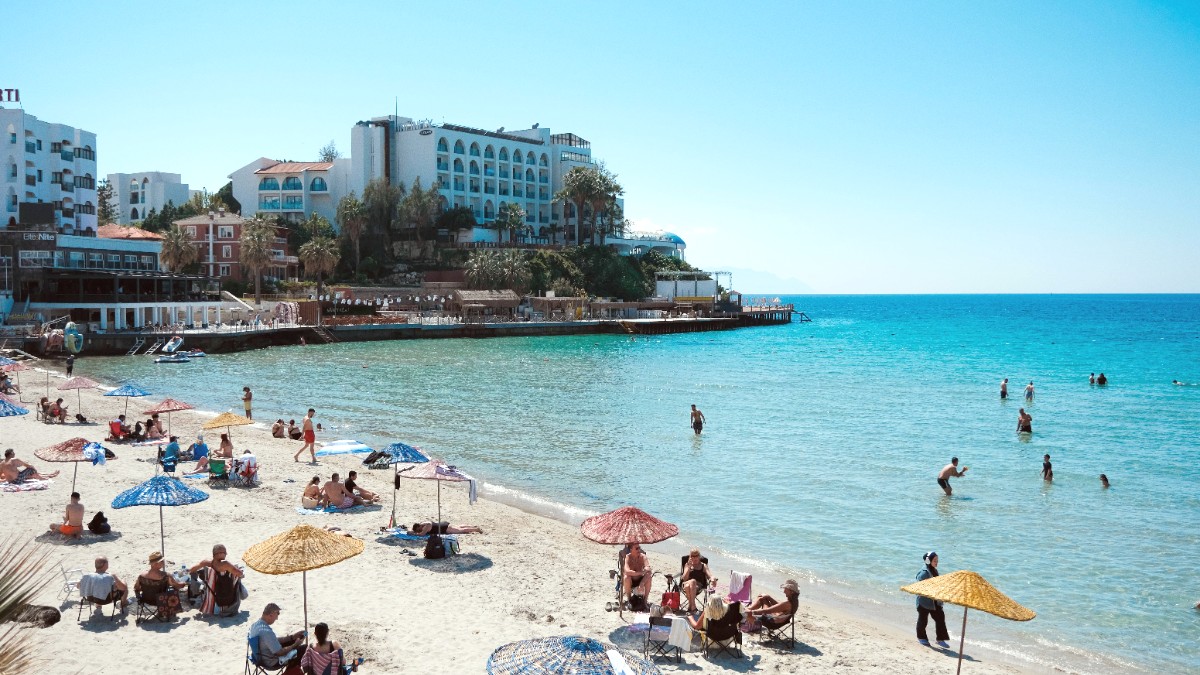
Mediterranean Coast, Turkey
Turkish cuisine blends Central Asian, Middle Eastern, and Mediterranean influences, a heritage from the vast Ottoman Empire. Fresh, seasonal ingredients are central to Turkish cooking.
Kalkan’s local cuisine features abundant fresh seafood, due to its coastal location, alongside traditional Turkish mezes and various kebabs.
Kalkan falls within this region, characterized by extensive use of olive oil, fresh vegetables, and fish, contrasting with other Turkish culinary styles.
Turks are known for their hospitality. Expect to be offered tea or coffee. Meals are often social. Bread is served with almost every meal for scooping sauces.
Breakfast (Kahvaltı) is a significant meal, often a large spread. Lunch (Öğle Yemeği) is lighter. Dinner (Akşam Yemeği) is the main meal, starting from 7:00 PM onwards, especially in summer.
A selection of small, cold or hot appetizers like haydari, eggplant salad, and fried cheese rolls. Most restaurants offer a wide array.
A great way to start any meal.
Kalkan excels in fresh seafood. Try grilled sea bass, sea bream, calamari, or octopus. Harbor-side and rooftop restaurants specialize in fresh catches.
A must-try in coastal Kalkan.
Lahmacun is a thin, crispy Turkish pizza. Pide is a boat-shaped flatbread with various toppings. Both are popular and affordable street food options.
Perfect for a quick, delicious bite.
Layered pastry filled with chopped nuts, sweetened with syrup or honey. A rich, sweet treat.
A sweet, chewy confection in various flavors and textures.
Kalkan is known for quality restaurants, many with rooftop terraces offering panoramic sea views and a sophisticated atmosphere.
Many options offer traditional Turkish cuisine, fresh seafood, and international dishes. These provide good quality food in a comfortable setting.
For authentic, affordable Turkish cooking, look for "lokanta" establishments. Smaller pide and lahmacun shops offer economical and delicious options.
Turkish cuisine has many vegetable-based mezes, salads, and dishes. Börek, lentil soup, and vegetable casserole. Vegan options may require careful inquiry.
Most restaurants can accommodate requests with some advance notice.
Awareness is growing, especially in tourist areas. Communicate your needs clearly to restaurant staff. The Turkish word for gluten-free is "glutensiz."
Many grilled fish and meat dishes, along with rice and vegetable mezes, are naturally gluten-free.
All meat served in Turkey is generally Halal.
Kosher food is not widely available outside of major cities with Jewish communities.
Use apps like Google Translate (download Turkish for offline use).
Carry a printed card explaining your dietary restrictions in Turkish for clear communication.
Fresh figs, pomegranates, and various citrus fruits are abundant in season. These are available at local markets.
Enjoy fresh, local flavors.
Special desserts or savory dishes may be prepared during religious festivals like Eid.
Experience seasonal traditions.
Mezes are shared among the table, encouraging communal eating and a relaxed dining pace.
Many Kalkan restaurants capitalize on the town's hillside location to offer spectacular sunset dining.
Some local businesses or boutique hotels in Kalkan may offer basic Turkish cooking classes.
Community-based tourism initiatives are less prevalent in Kalkan.
The Hammam (Turkish bath) is a traditional cleansing and relaxation experience.
Kalamar Beach Club and Kisla Beach Club offer sunbathing platforms and direct sea access.
Facilities include restaurants and bars for a full day of relaxation.
Many luxury hotels and some private villas offer spa facilities including Turkish baths and massage services.
Inquire about seasonal yoga or meditation retreats.
Some restaurants and bars in Kalkan Old Town feature live music, ranging from Turkish folk to jazz, creating a pleasant evening atmosphere.
Kalkan has a relaxed and sophisticated nightlife. It focuses on dining and drinks at rooftop bars with stunning views rather than major clubbing.
While Kalkan does not host major cultural festivals, local village festivals may occur periodically. Inquire locally for dates.
Always try local specialties at the weekly market for fresh flavors.